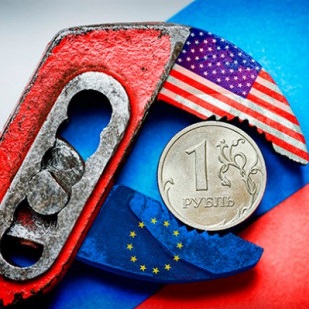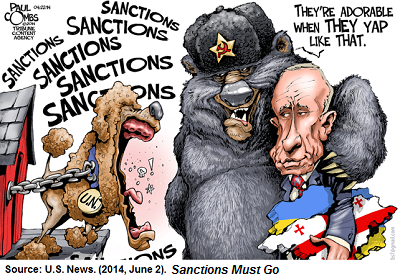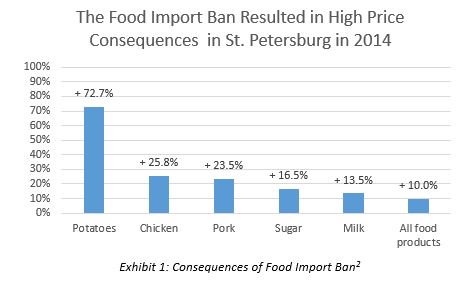Where to find Swiss cheese: how sanctions affected Russian economy
United States and the European Union instituted sanctions against Russia are a small piece of a puzzle of relationships between Russia and the West. It is time for the economic development in Russia to enter a new phase of independence.

United States and the European Union instituted sanctions against Russia are a small piece of a puzzle of relationships between Russia and the West. It is time for the economic development in Russia to enter a new phase of independence.

by Anna Poplasky, AMBA ’17
In 2014 the United States and the European Union instituted sanctions against Russia, the world’s largest nation with a population of 145 million people. The withdrawal of economic and trade partnerships were specifically aimed at punishing Russia for violating international norms and standards and annexing Crimea. Personal sanctions banned certain government officials from traveling to Europe and the United States. Business sanctions targeted various sectors of the Russian economy, mostly oil exports.

The American sanctions were aimed at the energy sector which makes up a large chunk of country’s gross domestic product. The Russian oil companies cannot do business with the United States or Europe and no oil technology can be sold to Russia. However, such isolation could have eventually happened even without sanctions as the diversification of export markets as well as the development of own manufacturing capacity is long overdue.
European sanctions pose financial restrictions, prohibiting banks from engaging in financial activity with Russia. This left Russian investors looking elsewhere for loans and at a much higher cost of borrowing. Russia responded by placing an embargo on European products, such as all-time Russian favorite Swiss cheese.
How effective were the sanctions and are they a good method of punishing the Russian economy?
This spring I traveled to Moscow to find out what has changed and in what way. I talked to young professionals, social scientists, and entrepreneurs, to find out whether the sanctions have had any effect on their day to day lives. Russia’s GDP was $2.053 trillion (in US dollars) in 2014, according to the World Bank dropped to $1.331 trillion in 2015 – a drop of about 35%. Adjusted for inflation, however, the drop was more like 3.7% because of the struggling ruble Prices on consumable goods increased, rubble weakened, and the incomes were slashed in half. However, the production of Russian goods increased drastically resulting in a higher price tag for domestic goods (Exhibit 1). Whether Russian goods can compete with European in terms of quality is a different question.

Those who live in large cities, such as Moscow and St. Petersburg, aren’t in favor of sanctions. “I used to work at a financial services company which closed shortly after the sanctions were imposed. After that, I decided to start a tech company (mobile payments solution) with a few of my friends from the bank. It has been difficult, but mostly to deal with the regular bureaucracy in Moscow. You need to know people to get ahead in the industry.”, says a former banker.
As you go about 6 hours outside of Moscow, sanctions don’t seem to matter to many. “Life hasn’t changed much for us. I mean, I wasn’t able to afford European goods before, why would it matter to me if they aren’t selling them anymore. The political elites are probably suffering though.”, says a resident of Livny, a small town outside of Moscow with a population of 50,000 people.
What struck me the most while being in Moscow for 10 days was a number of political shows on TV. They seem to show a healthy debate about current political and economic situation in Ukraine, Syria, and how it relates to Russia, but much of that is propaganda coming from the Russian government. Leontiy Byzov, a member of the Sociology department at the Russian Academy of Sciences thinks that the and their consequences thoroughly but the general population doesn’t take it seriously. “There is a lot of inertia in our society today. Many people don’t even want to bother thinking what is going on, hoping for the government to resolve all the problems. The generation of people who grew up during the Soviet Union is still very reliant on the government. The society needs a much bigger shake-up to realize the consequences of the situation”, he says.
The complete economic isolation of Russia is unlikely since world goods and services markets are interconnected and British and American companies are going to experience the effect of isolation. The growth of domestic sectors, such as manufacturing, pharmaceuticals, and biotech have potential to be developed as Russia eases dependence on imported technology.
Overall, sanctions are a small piece of a puzzle of relationships between Russia and the West. It is unclear what direction the current US administration will go with regards to US-Russia relations. Nevertheless, it is time for the economic development in Russia to enter a new phase of independence.
